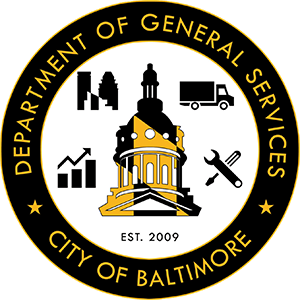

Our Vision: A future where clean, reliable and affordable energy powers the City of Baltimore through continuous innovation and dynamic partnerships across agencies
Energy keeps Baltimore running.
DGS leads the City’s strategy for the decarbonization of City buildings and fleet. We support our agency partners to reduce energy costs and achieve Baltimore City’s and Maryland’s climate and greenhouse gas reduction goals.
WHAT WE DO
At the heart of our mission, we seek to make a difference in the lives of the families of Baltimore through cleaner air, and to reduce Baltimore’s contribution to climate change. But it goes beyond environment and public health. When we save money on energy costs, those dollars go towards improved services for city residents, instead of to the utility company.
The Division has three main functions:
| Baltimore’s Climate Goals The City’s current goal is to achieve a 100% reduction in net greenhouse gas emissions by 2045 for City buildings and fleet. The DGS Energy Division collaborates with the Baltimore City Office of Sustainability and other agencies to develop and implement the City’s Climate Action Plan and Sustainability Plan. Learn more about these plans here: https://www.baltimoresustainability.org/ |
ABOUT US
We are architects, analysts, project managers, and certified energy managers that scour the City for energy saving opportunities. The Energy Division works with the DGS Facilities Maintenance Division to identify and implement energy saving opportunities in how we operate and maintain buildings. We work with the DGS Capital Projects Division to guide investment into projects that achieve large energy savings when we do major improvements. We partner with the DGS Fleet Management Division to plan the transition of the City’s fleet to zero emission vehicles.
| We are hiring! The City is investing in our energy future and adding five new positions to the Energy Division. This is an opportunity to grow this office and to be on the front lines of mitigating climate change. We need dedicated and passionate staff that want to get into the details and work across agencies to make progress! More details to come on this website and at: https://baltimorecity.wd1.myworkdayjobs.com/External |
Contact
Julia Kalloz, Chief
Energy Division Chief
Department of General Services
200 N. Holliday St., 8th floor
Baltimore, MD 21202
410-925-6130
Energy Data and Performance
The Energy team’s daily work includes working with agencies to understand their utility costs and performance and assist in accurately budgeting for energy costs.
The Energy Data and Performance team is responsible for:
| What’s new in DGS Energy? In FY2022 DGS launched with Baltimore Energy Data Initiative. The goal of the initiative is to make the City accountable for how we use energy. We are using data to identify the best opportunities for energy efficiency improvement by benchmarking buildings against their peers in the City (internal) or with similar buildings across the nation (Energy Star Portfolio Manager). The Initiative includes four steps: (1) verify the account data and building use of every account, (2) benchmark performance, (3) track the results of energy projects, and (4) set targets for a municipal building energy performance standard (BEPS). |
Energy Project Management
The Energy Project Management team is responsible for identifying, designing and implementing energy efficiency and renewable projects. This includes participating in the design process for large capital projects, identifying opportunities to save energy by changing how buildings are operated, and the implementation of energy performance contracts.
Some project examples include:
• Installation of LED lighting at small and large sites
• Installation of heat pumps for fire stations
• Retro-commissioning of HVAC systems to ensure efficient operations
• Contributing to design standards and requirements
A key tool for the Division is obtaining grant funding from the Maryland Energy Administration. Since FY2019, the Division was awarded more than $2.2 million dollars that go directly to City buildings that provide public benefit. In particular, the City pursues funding from the MEA Low and Moderate Income Grant Program. For these awards, we work with agencies to prioritize sites that are important resources for Baltimore residents, and seek funding to improve conditions and comfort for those buildings that provide critical resources.
| What are Energy Performance Contracts? Grants don’t cover the bill for replacing large complex systems. Energy Performance Contracts are a financing method where the City borrows money to pay for an energy project where the lifetime energy and operational savings of the project exceeds the total costs. Since 2006, the City has financed more than $100 million in Energy Performance Contracts. |
Energy Policy and Strategy
The Division’s Energy Policy and Strategy group is responsible for guiding City agencies in complying with federal, state, and local policy – but also crafts the strategy that City agencies will follow to decarbonize our facilities and fleet.
The Energy Division works in partnership with the DGS Fleet Division on zero emission vehicle infrastructure planning and is kicking off a new initiative to support agencies in the pursuit of beneficial electrification. This group is critical in ensuring energy management This group is critical in ensuring energy management best practices throughout City government and supporting cultural change.
| Benchmarking Benchmarking requirements are an important policy tool, often a first step for building owners understand their buildings. Benchmarking looks at energy use, typically over one year and standardized for weather events to compare to itself in prior years and similar buildings. Benchmarking often uses Energy Use Intensity (EUI), or the energy use per square foot. This allows for comparisons of buildings by similar types but different sizes. Energy Star Portfolio Manager is a free tool to benchmark your buildings. Maryland will start requiring buildings over 35,000 square feet to benchmark beginning in 2025. |